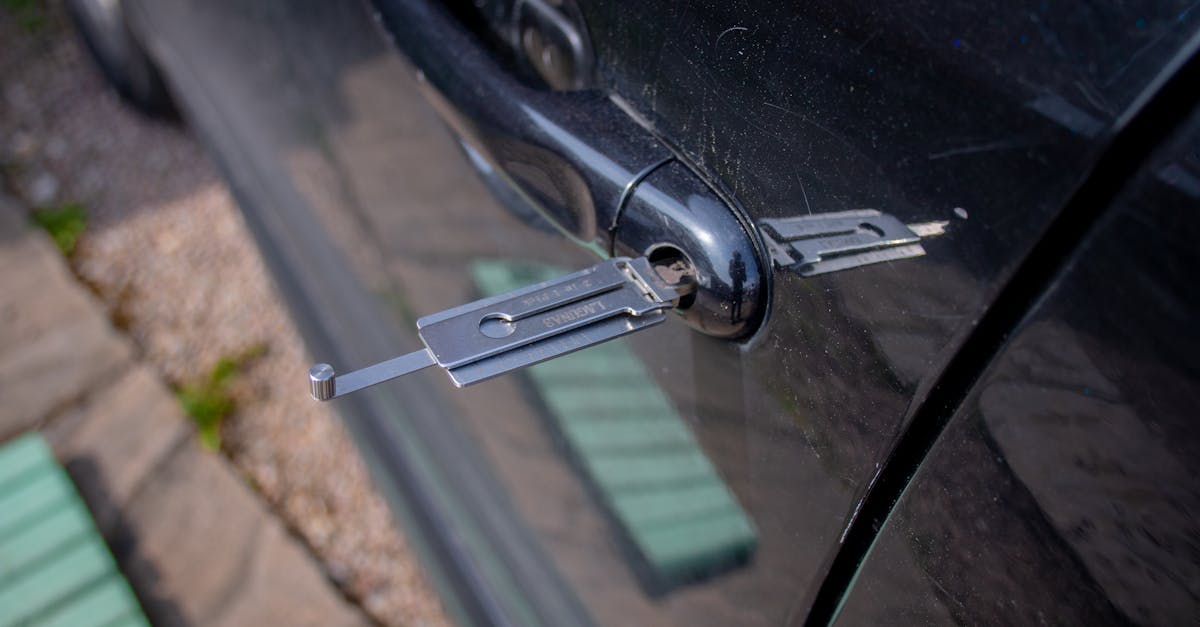
Master Keys and Different Lock Types
Master key systems are designed for flexibility, allowing a single key to operate multiple locks while still offering restricted access to certain areas. Various lock types, from pin tumbler to wafer locks, can be incorporated into a master key system installation. Different configurations can be created based on specific needs, making it easier for facility managers or property owners to streamline access for their staff while maintaining security protocols.
The effectiveness of a master key system largely depends on the compatibility of the locks involved. Each lock type has its own set of mechanisms and vulnerabilities, which can affect how well the system functions. While some locks lend themselves well to a master key system installation, others may present challenges that compromise security. Careful consideration is necessary when choosing locks to ensure the system provides the desired level of control and safety.
Compatibility with Various Lock Mechanisms
Master key systems can be tailored to work with a variety of lock mechanisms, such as pin tumbler locks, lever locks, and electronic locks. Each type of lock operates on specific principles, requiring careful consideration during the design of a master key system. Customising the keying process to accommodate different locks allows for controlled access levels within a building or facility. However, this compatibility demands a thorough understanding of each lock's intricacies to ensure effective operation and security.
When implementing a master key system installation, it’s crucial to ensure that all locks can be efficiently managed by the master key. This often involves integrating interchangeable core technology or utilising specific cylinders designed for master keying. The choice of lock mechanism can significantly impact the overall security of the system. Proper installation and integration are vital to preventing unauthorised access while providing convenient access for authorised users.
Risks Associated with Master Keys
Master keys offer convenient access but also pose significant risks. When a master key system installation is implemented, it creates a layered security model that can inadvertently expose vulnerabilities. If a master key falls into the wrong hands, it could compromise all locks within that system. This potential for widespread access necessitates thorough background checks and secure handling of master keys.
Moreover, the complexity of master key systems can sometimes lead to issues in security management. A poorly designed system may result in unintentional access points that can be exploited. Users may rely too heavily on the master key's perceived security, neglecting regular maintenance and updates necessary to safeguard their premises. These factors underscore the importance of careful planning throughout the master key system installation process.
Potential Security Vulnerabilities
Master key systems are designed to provide convenience and access control, but they also introduce potential security vulnerabilities. When multiple locks can be operated with a single key, the risk increases if that key falls into the wrong hands. Even if the locks themselves are robust, the overall security of a master key system relies heavily on the integrity of the master key. If an unauthorised individual gains access to the master key, they could potentially unlock all associated doors, compromising the safety of the premises.
Additionally, the process of master key system installation can inadvertently expose weaknesses in a facility's security. Poorly configured systems may have unintended access points, allowing staff or unauthorised visitors access to restricted areas. For businesses implementing these systems, it’s crucial to ensure that adequate security measures are in place to prevent misuse and to carefully vet who has access to the master key. When vulnerabilities are present, they can lead to significant security breaches, negating the intended benefits of convenience and accessibility offered by the system.
Professional vs. DIY Master Key Systems
When considering a master key system installation, opting for professional services often ensures a higher level of expertise and security. Professionals are familiar with various lock types and understand the intricacies of different locking mechanisms. Their experience can prevent potential future issues and guarantee that the system is tailored to the specific needs of the user. This expertise reduces the likelihood of security vulnerabilities that may arise from improper installation or configuration.
On the other hand, a DIY master key system installation can seem appealing due to potential cost savings. With many readily available guides and resources, homeowners may feel equipped to manage the project themselves. However, this approach carries inherent risks. Without adequate knowledge of lock mechanics, individuals may inadvertently compromise the security of their property. A poorly executed installation could lead to a system that fails to provide the intended ease of access while keeping unwanted entry at bay.
Pros and Cons of Each Approach
When considering professional installation for a master key system, expertise plays a significant role in ensuring optimal security and proper functionality. Trained locksmiths possess the knowledge to assess the specific needs of a property, tailoring the master key system accordingly. Their experience often results in a more reliable setup, preventing common mistakes that can occur with DIY approaches. Additionally, warranties and guarantees often accompany professional services, providing reassurance to property owners.
On the other hand, a DIY master key system installation can offer significant cost savings. Individuals who are handy and understand basic lock mechanisms may find this approach appealing and manageable. However, this option carries risks, as improper installation can lead to vulnerabilities, potentially compromising security. Time investment and a steep learning curve should also be considered before deciding against seeking professional help.
FAQS
What is a master key?
A master key is a special type of key that can open multiple locks, each of which may have its own unique key. It is commonly used in commercial settings, allowing access to various areas without needing a separate key for each lock.
Can a master key open any lock?
No, a master key cannot open every lock. It is designed to work with specific locks that are part of a master key system. The compatibility depends on the lock mechanisms and the configuration set by the locksmith.
What are the risks associated with using a master key system?
The primary risks include potential security vulnerabilities, such as unauthorized access if the master key falls into the wrong hands. Additionally, if the system is not properly managed, it may create weaknesses that can be exploited by intruders.
Should I choose a professional or DIY master key system?
It depends on your needs. Professional systems offer tailored solutions and greater security, while DIY options can be more cost-effective but may lack the same level of reliability and expertise. Consider the complexity of your lock requirements and your security needs before deciding.
How can I enhance the security of a master key system?
To enhance security, it's essential to limit access to the master key, regularly change locks when necessary, and consider using high-security locks that offer additional features, such as restricted keyways or advanced locking mechanisms.
